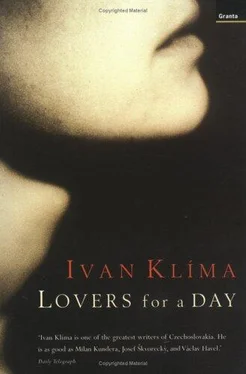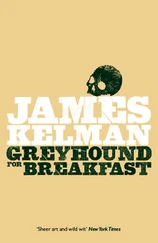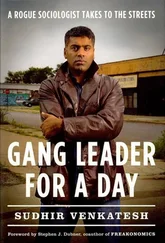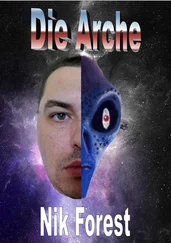'Didn't she give you a photo when she heard you were coming here to me?'
'There's something I'm beginning to remember. .' The scene returned to him so powerfully that he could actually see the cripple and if he'd been able to draw like her, he could have sketched a portrait of him. 'I found myself a really miserable job at Waterloo — nothing to do with medicine. I used to travel to it every morning. One day when I was getting on the underground train in Finchley there was a little guy on crutches standing there staring by the newspaper stand. He wasn't buying or selling anything, just leaning on his crutches gaping. He was still young and he was ginger-haired the way that only the English can be, or rather the Welsh or the Scots. And he was staring at me. He had to go and choose me out of all people. He was smiling but it wasn't a pleasant smile, there was something cunning or hateful about it.'
'And were you scared of him?'
'No. I somehow knew I needn't be afraid of him.'
'Is that all?' she asked when he fell silent.
'No. That was only the beginning.'
She pressed him to her. 'Do you still love me?'
'Yes. I love you so much that I had to come back and didn't care what would happen to me.'
'Do you think they'll put you in prison?'
'It doesn't matter. I knew I couldn't stay somewhere I had no chance of seeing you.'
'I wouldn't want them to send you to prison. At least not now that I'm with you,' she explained. 'That guy at reception — didn't you notice the way he was looking at you?'
He shook his head. 'I wasn't looking at him. My eyes were on you.'
'You ought to have been looking. You ought to be a little wary — when you're with me, at least. I'm married, don't forget. But you didn't finish telling me about the ginger man.'
'Oh, yes. Well, just imagine, when I got off the underground at Waterloo station that fellow was standing at the top of the escalator. He was standing there watching me as I rose towards him.'
'I expect he was tailing you. And he'd come there by car.'
'At that time of day the underground is the fastest way to go. He was standing there on his crutches. Ginger and smirking. No, he didn't follow me. He went off towards the exit and didn't look back once. So I decided to follow him, even though I was on my way to work. He was making for some working-class houses that are all over that area, and I set off after him. He lurched along on those crutches like a walking scarecrow. Eventually he disappeared inside one of the houses — a working-class brick house. I hesitated for a moment but I knew I had to go in after him. The passage was lined
with doors and no other way out. I should have left, but instead I started to ring their bells one by one. It occurred to me that I wouldn't leave, that I couldn't leave, until he had opened his door and explained to me how he came to be at the station. But he didn't open up. I started to thump one of the doors and shout. I made such a racket that it must have been heard on the street, but the door didn't open and the silence inside seemed to me almost deathly. Like the first time I set foot in an autopsy room or a mortuary. I've no idea where the fellow disappeared to. Unless he jumped out of the window. With those crutches.'
He was so absorbed in his story that for a moment he had forgotten all about her. Now he looked in her direction. She was asleep.
He got up. The heat was almost unbearable. He went over to the window and tried in vain to open it. Even the floor tiles in the bathroom were warm. He turned on the cold-water tap but nothing came out. So he ran a little hot water into the basin and washed his face. He caught the sound of footsteps quietly approaching in the corridor. They stopped when they reached their door.
He waited for them to start moving away again, but silence had descended on the corridor again. He realized that he was afraid. He ought to open the door and find out who, if anyone, was standing outside, but he couldn't bring himself to do it. He stood there wet, naked, tense and alert in the middle of a strange bathroom in a country which, although he had decided to come back to it, was in reality now also alien to him, and his fear increased by the moment.
He returned to the bedroom. She was sleeping. Red and white reflections played on her naked body. Why were the
windows here sealed? Why had the desk clerk watched him so closely? Did he know him from somewhere?
He continued to listen intently. There was still no sound from the corridor. Outside a car sounded its horn and from a long way off a strange rumble started to approach. It could be the sound of machines in an unseen factory or the sound of tanks on the move. Whose tanks? All tanks were under the same unified enemy command. Why had he returned, in fact? Had he really come back on account of the woman who happened to be with him at this moment but actually belonged to another man? Had he returned for this moment of ecstasy that he could have found more easily elsewhere, as he'd never had a problem finding women to experience it with?
He sat down in the armchair. He took a sheet of writing paper out of the folder and started to fold it into a shape he remembered from his childhood. He no longer felt any yearning, or even happiness at being close to the woman he had yearned for. He felt hungry, tired and vaguely uneasy. Where would he go tomorrow? And the following day? He was too old to go back to his parents and he had no home of his own. All he had was a room for tonight and tomorrow morning. Unless he prolonged the stay and persuaded her to remain a day or two longer. The thought of having to leave the room and go out into the street seemed unbearable.
The rumble of the distant tanks did not stop. He completed the shape and laid it to one side on the glass table top. Then he got ready to start another one.
'Doc,' he heard from behind him, '-what are you up to? Why aren't you here with me?'
He started. 'It's a sort of game.' He inserted his fingers into the paper pockets and opened and closed the paper mouth.
Heaven, hell, paradise
where's your soul to go?
Into heaven, into hell
Just like so.
'Where are you now?' she asked.
He listened to the roaring from outside. He thought it was coming closer. When the soldier knocked down the door, he ought to tackle him. But the only weapon he had available was the bottle opener. 'Here,' he replied, 'with you.'
'And what about your soul?'
'I don't know if I have a soul.' When he was small he had believed he had one and that it was immortal, but he had seen too many people die since then, and little had remained of their souls after their brain cells had been eroded by old age or disease. He was going to say something more but she spoke first. 'No, yqu don't have a soul. That's why you're able to do those things so well!'
Yes, that's what he was to her — a means of pleasure. While he happened to be around. Who had been the means when he was away?
'What's hell?' she asked.
He shrugged. He knew she wasn't expecting a serious answer. None the less he said, 'I went to see a play when I was over there. There were these people shut in one room, where they were together all the time. For eternity, you understand — the same people. That was the author's idea of hell.'
'And what's yours?'
'I don't know. I think hell is different things for different people. Hell is being defenceless when someone is pointing a pistol at you and telling you he's doing it because he loves you.
Hell is suffering. Having a bad conscience. Being bored. Listening to lies. Hearing the truth. Losing your freedom. .'
'You're beating about the bush. And how about paradise? Do you know what paradise is, at least?' she asked.
Читать дальше












